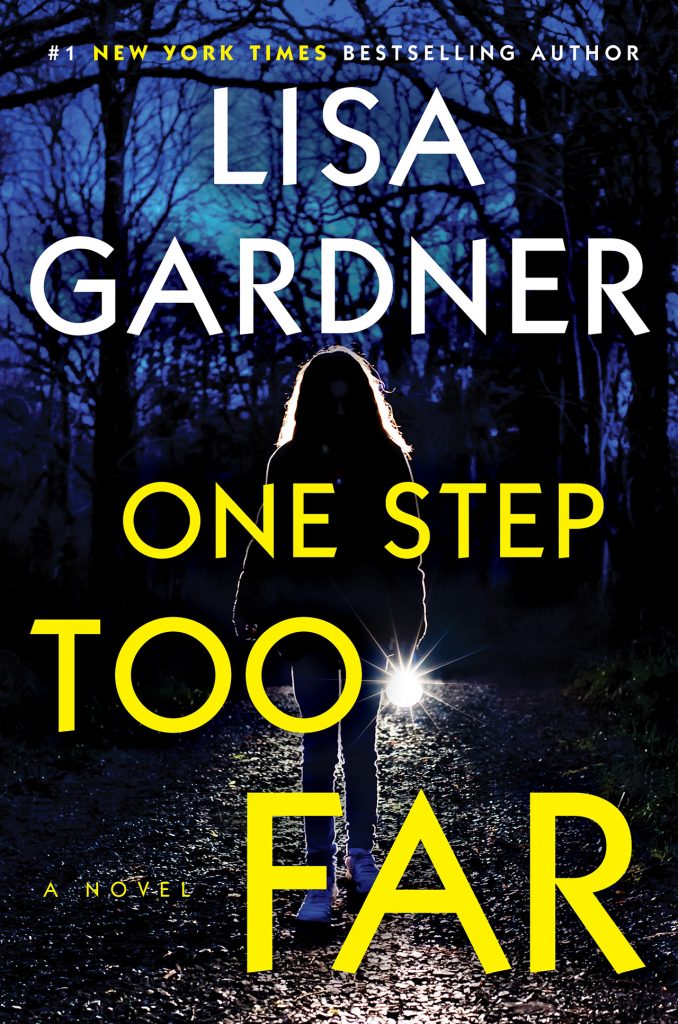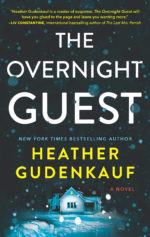 Synopsis:
Synopsis:
Frankie Elkin, a woman who will stop at nothing to find the missing people that the rest of the world has forgotten, returns in One Step Too Far.
Timothy O’Day knew the woods. Yet he disappeared on the first night of a bachelor party camping trip with his best friends. He didn’t leave a trace. But what he did leave behind were two heartbroken parents, a crew of guilt-ridden groomsmen . . . and a pile of clues that don’t add up.
Frankie Elkin doesn’t know the woods at all. But she knows how to find people.
So when she reads that Timothy’s father is organizing one last search for his son five years after he disappeared, she heads to Wyoming. Despite the rescue team’s reluctance, she convinces them to let her join them.
But as they hike into the mountains, it becomes evident that there’s something dangerous at work in the woods . . . or someone. And he or she is willing to do anything to stop them from going any farther and learning the truth.
Running out of time and up against the worst man and nature have to offer, Frankie and the search party discover what evil awaits those who go one step too far . . .
Review:

Frankie Elkin, the ordinary but strong woman with a troubled past and a mission to find missing persons, was introduced by bestselling author Lisa Gardner in Before She Disappeared. Gardner was inspired to create the character when she happened upon an article about Lissa Yellowbird-Chase, a woman who gave up everything in order to pursue cold cases because of her belief that too many missing children of color are forgotten and the mysteries surrounding their disappearances never solved. Gardner found Yellowbird-Chase’s work “inspiring” and “a bit mesmerizing.” She wondered, “What would that look like?” and decided to explore the question via Frankie’s fictional journeys.
“I tried real life once. There was a house, a job, even a man who loved me enough to hold my hand as I fought my way to sober,” Frankie explains. But there is no longer a place Frankie calls home. Ten years ago, a woman in an Alcoholics Anonymous meeting shared that the police showed little interest in her daughter’s disappearance. “I became intrigued, started asking questions, and the next thing I knew, I’d found the daughter.” In the years since, Frankie has traveled wherever the cases lead her, volunteering her services. She learns about missing persons in online forums and chat rooms by using computers in local libraries. She decides which cases to pursue solely by gut instinct. Frankie is searching for missing people, as well as something else. Gardner believes Frankie is “searching for herself. She’s obsessed. She’s looking for the why of it.” Frankie confesses, “I don’t always know why I choose the cases I do.” But “it works” for Frankie, who is an addict and an outsider wherever she goes.
In One Step Too Far, she pursues the case of Timothy O’Day, who went missing five years ago, in large part because Tim’s mother is dying and “just wants to be buried next to her son.” Frankie planned to go to Idaho to help search for an eight-year-old boy who vanished sixteen months ago. But when she learned that Tim’s father has been organizing annual expeditions to search for his son’s remains and has planned one final attempt to locate and bring his boy’s body home in order to grant his wife’s dying wish, Frankie just knows that she has to be part of the search team despite the fact that she is not ready for the harsh conditions she will encounter in the Popo Agie Wilderness. For one thing, she lacks the requisite clothing, equipment, and supplies, as well as the funds to purchase the items she will need. She is not an experienced hiker. And when she arrives, the members of the team are assembling and strategizing, but they do not readily welcome the outsider into their midst.
None of them expect to miraculously find Tim alive. Rather, the searchers will be accompanied by a cadaver dog because, if they are lucky, they will retrieve Tim’s bones so they can be buried next to his mother. Frankie knows well that the kind of search on which she and the other members of the team are about to embark is about “gaining closure.” Perhaps his parents can find some peace by finding tangible remnants such as bones or personal effects. Perhaps it will help them to simply understand, at long last, what exactly happened to Tim and caused his demise.
Tim was an experienced hiker and outdoorsman, having been taught by his father to survive in the wilderness. So he was the acknowledged leader of the group of five young college friends who decided a camping trip would be the perfect way to celebrate Tim’s upcoming nuptials. It was to be their last weekend get-away before the end of Tim’s bachelorhood. Tim, Scott, Neil, Josh, and Miguel set up camp. But after an evening of heavy drinking, Scott disappeared in the middle of the night and Tim ventured out to find him. Unfortunately, he never returned. He disappeared without a trace. Although hundreds of volunteers combed the woods for weeks after he vanished, none of his equipment (backpack, headlamp, clothing, etc.) was even found. Scott resurfaced, claiming to have no memory of what happened on that fateful night.
My life is filled with ghosts. Images and stories of people I never knew and, in most cases, never will. They haunt me. And yet I keep coming back for more, collecting memories that aren’t even my memories and clutching them tight to my chest. If you hoard other people’s tragedies, does that make your own easier to bear? I’m still waiting to find out. ~~ Frankie Elkin
Eventually, Frankie convinces the group to let her join them, and she, along with an experienced resident, Tim’s grief-hardened father, Tim’s four friends, a Bigfoot hunter, and a search-dog handler all head up the mountain. Frankie is well aware that the greatest danger “comes from the eight humans who just hiked” into the wilderness, and although she does not yet understand why it ultimately matters, she knows that she must get to know her companions.
In Before She Disappeared, Gardner established Frankie as an endearingly complicated and puzzling protagonist who must constantly safeguard her sobriety. Gardner revealed part of Frankie’s troubled history and permitted her to develop feelings for Dan Lotham, the lead detective on the case she worked in Boston. She was tempted to remain there and attempt to maintain a stable relationship with him but knew herself well enough to know that she had to continue her quest to find the missing. Gardner evocatively depicts Frankie’s longing for love and desire to run back to Boston and let herself fall into Lotham’s strong arms. “Except then it will be morning. There’s always morning.” Gardner says Frankie has to keep moving because if she stays in one place, she will drink.
Gardner ramps up the dramatic tension as Frankie learns about the histories of the other members of the search party. Details about their relationships, long-held secrets, and resentments come to light. Gardner surrounds Frankie with a compelling cast of supporting characters which includes her setting. The vastly beautiful but perilous wilderness area in which the search is being conducted serves as an additional character, providing context and heightening the intrigue. Gardner injects the tale with authenticity, in part because she is an avid hiker who lives in the mountains of New Hampshire. She relates that penning the book was one of her most enjoyable writing endeavors because hiking is an integral part of her writing process. When she finds herself stuck or in need of inspiration, she goes out on a trek. She spent more time in the outdoors when the world shut down during the COVID-19 pandemic, taking longer and more adventurous hikes in areas beyond cell phone coverage or the reach of rescuers. She describes it as “isolating, exhilarating, terrifying.”
Gardner understands perfectly why Frankie has “struck a chord” with readers. “She is empathetic. . . . Frankie is not a crack investigator, she is not a hacker, she does not have superpowers. However, she is an excellent listener. And she cares. She’s an alcoholic and has done all sorts of bad things. Her family was imperfect. She does not judge. She is genuinely interested in people, in hearing their stories, and in providing that kind of balm she inevitably gets the information necessary to bring things together. I think she’s both fascinating and vulnerable, but soothing in a world where everyone wants to be hurt but nobody cares to listen anymore.”
Still, Gardner finds it challenging to write Frankie’s first-person narrative. “I am her and she is us. She is a proxy for the everyday, average person.” What sets her apart is her obsession with finding people who have gone missing. Frankie is adept at asking questions and the key to her success is the fact that she is an outsider rather than a trained member of law enforcement She can ask questions and employ techniques that are unavailable to professionals.
But in this story, Frankie is in the wild, isolated with a group of people she quickly discovers are not really a cohesive group at all, but they will have to rely on each other in order to survive. Frankie can’t simply pursue interviews with neighbors and friends of the missing person. She has access only to the members of the search party who Gardner gradually reveals to be untrustworthy. Equipment and supplies go missing. There is a strong sense of being watched. Soon bodies begin piling up. Someone is intent on sabotaging the expedition. But who? And why? Frankie soon regrets her decision to pursue the case as the group proceeds further into the wild and her lack of survival skills becomes increasingly apparent and potentially lethal. She has to figure out her companions’ alliances, as well as their motivations for revenge and the bases for their efforts prevent the truth from finally coming to light. If she fails to carry out her mission, she may not emerge from the woods at all. So Frankie has to bring something unique “to the table” in order to solve the case. “Her superpower is people – listening, learning, adapting.” Gardner poses the question of whether the result will be survival of the fittest or the most adaptable. Gardner propels the story forward at an unrelenting pace as Frankie, who “is not the fittest,” proves how adaptable she is. Adaptability is a skill that many people had to acquire during the pandemic, Gardner observes. And it proves to be the key to Frankie’s ability to solve the case and live to relate to readers how she accomplishes her goal.
One Step Too Far is yet another engrossing, propulsive, cleverly-plotted, and unpredictable mystery from a master storyteller who again demonstrates that she is at the top of her form with this series. Gardner says, “I read for character, character and character. I’m looking to see the world through someone else’s eyes and in doing so, having my own eyes opened to fresh experiences, issues and ideas.” The series succeeds because it is, at its core, an intriguing exploration of Frankie’s psyche. In her second outing, Frankie’s quest to discover what happened to Tim is an emotionally resonant examination of the grief of loss, guilt, and the tenuous bonds of friendship. Readers will find themselves further enamored with the irascible, stubborn, but compassionate woman who is compelled to keeping moving from place to place, and clamoring for the next volume, anxious to see what case Frankie next pursues . . . and if she will find what she is looking for.
Excerpt from One Step Too Far
Chapter 1
The first three men came stumbling into town shortly after ten a.m., babbling of dark shapes and eerie screams and their missing buddy Scott and their other buddy Tim, who set out from their campsite before dawn to get help.
“Bear, bear, bear,” first guy moaned.
“Mountain lion!” second guy insisted.
Third guy vomited.
Maybe, maybe not, Marge Santi thought, as she sidestepped the spew of liquid. Marge situated the young men in a corner booth of her diner, then got on the phone and summoned Nemeth. To be polite, Marge also contacted Sheriff Jim Kelley, likeable guy, respected by the locals, but an officer with a whole county to tend and the drive to prove it. For immediate action, Nemeth it was. Nemeth, former Shoshone National Forest district ranger, now local guide, knew what he was doing. First, he plied the three men with coffee. To judge by the rank odor of fear and booze leaking out of their pores, they didn’t need anything else. Two cups later, he had most of the story.
Five guys set out into the woods for a bachelor party weekend.
All friends since college, all with some experience camping, though the trio agreed future groom Tim was The Man. Had been back?country hiking with his father since he was six. He was the reason they were camping. The other four wouldn’t have minded a golf weekend or quality time at a casino/resort. But for Tim, the woods were his happy place, so into the mountains they’d gone. Fully equipped, packs, tents, sleeping bags, two-burner propane camp stove, cans of beans and franks, and yeah, as much beer and Maker’s Mark as five fit young men could carry. Which was to say, a lot.
But they weren’t total idiots. Again, Tim knew his shit and oversaw their packing himself.
They’d hiked in seven miles yesterday, looking for the perfect camping spot in one of the deep canyons, near a broad river. Once they found it, they’d unloaded packs, pitched tents, and popped open the first sixpack, leaving the other four to chill in the ice-cold water.
Dusk came fast this time of year. But all was good. They built up a fire, roasted hot dogs, and ate baked beans straight out of the can. Many fart jokes ensued.
More beer, followed by whiskey chasers. How much booze can five young healthy men drink? Plenty. But no place to be, no cars to drive, no nagging cell phones to answer given the lack of reception.
Just them and the starlit sky. They killed off the first bottle of Maker’s Mark, started in on the second. Tim sat next to the fire and scratched away on a piece of paper. Working on his wedding vows, writing a letter to his beloved? They teased, but he refused to fess up.
Hour grew late. How late, no one knew and it hardly mattered.
They finally turned in for the night, two men each in two tents, Tim, the future groom, in a single shell all by himself. One of his last nights on earth sleeping alone. Should enjoy it while he could, they teased.
Then . . .
A sharp keening wail. Crashing in the trees around them.
“Grizzly,” Neil said now, sitting in the diner.
“Mountain lion,” Josh insisted.
Miggy, short for Miguel, crawled out of the booth and vomited some more.
Maybe, maybe not, Nemeth thought. Marge got a mop.
At the camp, the men had burst from their tents, flashlights bobbing, nerves strung tight, trying to pinpoint the source of the disturbance. Build up the fire, Tim demanded. Make noise of their own.
Double-check the food stash they’d strung up in the trees away from their campsite.
Which is why it took a few minutes, maybe as long as five or ten, before they realized their party of five had become four. Where the hell was Scott?
Miggy had been sharing his tent and Miggy had no idea.
“No . . . fucking idea,” Miggy clarified for Nemeth, in between bouts of dry heaving.
Tim, future groom, got serious. Scott could’ve wandered off to pee. Scott could’ve just plain wandered off, drunk and disoriented.
But given the cold temps, dangerous terrain, and carnivorous local wildlife, they needed to find him.
Arranging their group into two pairs, Tim directed the first duo to start searching north of the campfire, while the other would cover the woods to the south. Whoever found Scott first would blow their emergency signal whistle.
Except they didn’t find him. Up and down the water, bush?whacking deeper and deeper into the forest. No Scott. But they did find trampled brush. Broken tree limbs. Possibly blood.
“Grizzly bear,” Neil moaned.
“Mountain lion,” Josh ventured.
“Fuck me,” Miggy whispered.
That, Nemeth agreed with.
Four a.m., the fall air brutally crisp, the clear night relentlessly dark, Tim made the decision: They needed help, and given the total lack of cell reception, hiking back out was the only way to get it.
As the most experienced — and sober — member of their party, he grabbed his pack, clicked on his trusty headlamp, and set out for civilization.
Neil, Josh, and Miggy huddled around the fire for another three hours, pounding water and working themselves into a terrified frenzy. First glimpse of daylight, they refilled their canteens and hit the trail. Left everything behind. Tents, sleeping bags, food.
Young men, fit and now semi-sober, they were on a mission to get the hell out of there as fast as humanly possible.
Still tough going. They half ran, half stumbled their way up and down steep terrain, clambering over boulders, careening through brush, splashing across streams. Till they came to the trailhead and their rented ATVs. All five of them. Shouldn’t there be only four?
Which is when they started to get worried about Tim.
ATVs to town. Town to diner. And now . . . help. Nemeth. Sheriff. Cavalry. Hunters with big guns. Any kind of assistance, all kinds of assistance. Help.
Nemeth unfolded a topographical map, had the men walk him their journey. They knew their initial path, which, like a lot of backcountry trails, started out marked before hitting rugged, less traversed terrain. Definitely not for the faint at heart. But the men could guess where along the river they’d camped. From there, Nemeth ran his finger along various geological features, thinking, thinking, thinking. Marge worked the phone, brewed more coffee.
Being a mountain town, they had a local team of fifteen volunteer search and rescuers. Given the circumstances, however, this would be all hands on deck. Neighbors contacted neighbors, people started pouring in, and Nemeth did what he did best: organized the efforts.
First up, hasty team. He wanted his best searchers dispersed along key perimeter areas encircling the PLS — point last seen – of their two missing hikers. Taking into account the average distance a person could travel an hour in that terrain, Nemeth drew a massive ring around the site, identifying their prime search area. Hasty teams would hike, ATV, or horseback into various points along this ring, conducting a down-and-dirty search of the trail and surrounding areas as they swept toward the center. They’d look for the men, but also look for signs of human passage, which might provide additional data on where Tim the experienced hiker and Scott the drunk buddy could’ve gone.
Ramsey, a town of four thousand situated at the edge of the Popo Agie Wilderness, was filled with experienced outdoorspeople.
The mountains were both a lifestyle and a professional calling. Nemeth was a veteran general working with expert foot soldiers.
Which made it very hard for the family to accept what happened next. The first eight hours of the search, which turned up Scott, wandering blindly along the rocky banks of the river. Still clad in his long underwear, face covered in scratches, fingernails caked with dirt. Clearly disoriented and shellshocked.
“Grizzly,” Neil whispered.
“Mountain lion,” Josh repeated.
“Shit . . .” Miggy moaned.
Even sobered up, Scott couldn’t provide any details about where he’d been or what he’d done. He remembered drinking with his buddies around the campfire and teasing Tim for working on his wedding vows. Scott went to bed and . . . Daylight. Cold. So cold.
Wandering in nothing but his stocking feet, till he found his way back to the river and followed it. Eventually, people appeared, and a shrill whistle blew and now he was here and hey, where was Tim anyway?
Timothy O’Day. Thirty-three years old, first member of his family to go to college, graduating from Oregon State University with a degree in mechanical engineering. Described by his family and friends as a regular MacGyver. Engaged to be married to Latisha Gibbons, whom he’d met three years ago through his college buddy Neil. Latisha hailed from Atlanta, worked in marketing, and spent her weekends in a state of perpetual motion, hiking, biking, skiing, every bit as crazy as her future husband.
Everyone said they looked beautiful together. The ultimate, modern-day L.L.Bean couple. They’d buy a house, adopt a Lab, and produce 2.2 gorgeous children to chase along trails, down mountains, across streams.
Theirs was to be a wonderful, magnificent life lived out loud.
Until hours stretched into days stretched into weeks.
Tim’s family arrived on?site. His father, Martin, driving from Oregon to Wyoming with his mountaineering equipment piled in the back. Marty was a lean, nut-brown professional carpenter and experienced outdoorsman ready to take up the charge. In contrast, Tim’s mother, Patrice, appeared nearly translucent. Cancer survivor, the locals learned. Fifteen years ago, multiple bouts, barely made it.
Marge made it her mission to serve the woman coffee above?board and administer a little medicinal assistance on the down low.
Martin conferred with Nemeth and Sheriff Kelley, who’d taken charge of the search efforts. In the beginning, Martin would nod, approve, express his gratitude. By day five, he questioned and stewed. Day seven he headed into the woods himself, snarling under his breath when both Nemeth and Sheriff Kelley tried to hold him back.
The hasty teams stopped being hasty. Search efforts slowed, grew more methodical, no longer hoping for an easy victory, but now settling in to scour the wilderness foot by foot, trail by trail, grid by grid. Choppers scanned with infrared. Air-scenting dogs tracked areas of interest. Couple of psychics called in with hot tips, most involving flowing rivers or dark caves.
More volunteers showed up. The National Guard arrived to assist. Until twenty-three long, arduous, exhausting days later, as the temperatures plummeted and snow blanketed the upper elevations . . .
The searchers faded back to their real lives. The canine teams went home. The choppers were redirected to new missions. And only family and friends remained.
Martin O’Day fought the good fight the longest. He had a life?time of experience and the advantage of being the one who’d trained his son. He headed back into the mountains, expedition after expedition, while Patrice held press conferences with her future daughter?in?law by her side. Twin advertisements for grief and desperation.
The college friends, Neil, Josh, Miggy, and Scott, did their best to assist, while having to accommodate the demands of jobs, family, obligations of their own.
Martin O’Day searched for his son. Then he searched for signs of his son. And then he searched for his son’s body.
“Grizzly bear,” Neil whispered.
“Mountain lion,” Josh argued.
“Goddammit,” Miggy said.
As for the real answer, the woods never said. As seasons turned into years and Timothy O’Day became one more missing hiker, vanished without a trace.
Here are things most folks don’t know: At least sixteen hundred people, if not many more times that number, remain missing on national public lands. Hikers, day-trippers, children on family camping trips. One moment they were with us, the next they’re
gone.
There’s no national database to track such cases. No centralized training for search and rescue or, in many cases, even clear jurisdictional lines to identify who’s in charge of such operations. There’s also little in the way of designated funding. A large-scale search effort can cost upwards of three hundred thousand dollars a day.
For many county sheriffs, that’s their annual budget.
Meaning when the volunteers go away, so do rescue efforts.
Leaving behind a family with little hope and no closure. Most will continue on their own for as long as they can. Some, such as Martin O’Day, continue the hunt every year, assisted by friends, funded by online campaigns, and advised by various experts.
According to the article I’m reading in a small, local paper, Martin’s been at it for five years. This August will be his final attempt.
His wife Patrice is now dying from the same cancer that tried to kill her before. She wants to see her son one last time. She wants her body to be buried next to his.
I sit in a diner not so dissimilar to the one Tim O’Day’s hiking buddies must’ve rushed into the morning after. I’ve spent the past twelve hours on a bus and am now catching my breath, somewhere west of Cheyenne and south of Jackson, Wyoming. I don’t particularly know, and I’m enjoying a sense of freedom — life on the road — as I read the article again, then again. Something about the story has sunk into my skin, refusing to let go.
My name is Frankie Elkin and finding missing people is what I do. When the police have given up, when the public no longer remembers, when the media has never bothered to care, I start looking. For no money, no recognition, and most of the time, with no help.
I have no professional training. I’m not a former detective or registered PI or ex-anything special. I’m only me. An average, middle-aged white woman, short on belongings, long on regret.
I tried real life once. There was a house, a job, even a man who loved me enough to hold my hand as I fought my way to sober.
In the end, the walls closed in; the relentless sameness drowned me. And the man who loved me . . .
One day, a woman in my AA meeting talked about her daughter who’d disappeared and the police’s lack of interest in finding a young woman with a troubled past. I became intrigued, started asking questions, and the next thing I knew, I’d found the daughter.
Unfortunately, the daughter’s fucked?up boyfriend chose to blow off her head and abandon her body in a crack house rather than let her go. But despite the case not having a happy ending, or maybe because of that, one search became another, which became another.
Ten years later, this is now my life. I travel from place to place, armed with only my good intentions. Currently, I’ve been traveling by bus to Idaho to take up the case of Eugene Santiago, an eight-year-old boy now missing sixteen months. I read about Eugene’s disappearance in one of the various online cold case forums I frequent. Something about his soulful dark eyes, his very serious smile.
I don’t always know why I choose the cases I do. There are so many of them out there. But I spot a headline, I read an article, and then I just know.
Kind of like now, I think, setting down the local paper. I haven’t done a woodland search in forever. Mostly I work small rural communities or dense urban neighborhoods. I gravitate more toward kids than adults, minorities more than Caucasians. But my mission is to help the underserved, and as the families of those sixteen hundred people vanished in public parks will tell you, they are so underserved.
Mostly, I keep thinking of Timothy O’Day’s mother, who just wants to be buried next to her son.
Eugene Santiago has been missing for nearly a year and half. A few more weeks won’t matter. And while there may be no chance of finding Timothy O’Day alive, I know from experience that finally bringing home a body still makes a difference.
I pick up the bus schedule and plot my new destination.
Excerpted from One Step Too Far by Lisa Gardner. Copyright © 2022 by Lisa Gardner. Excerpted by permission of Penguin Group Dutton. All rights reserved.
Also by Lisa Gardner:
Frankie Elkin Series
Detective D.D. Warren Series








Comments are closed.